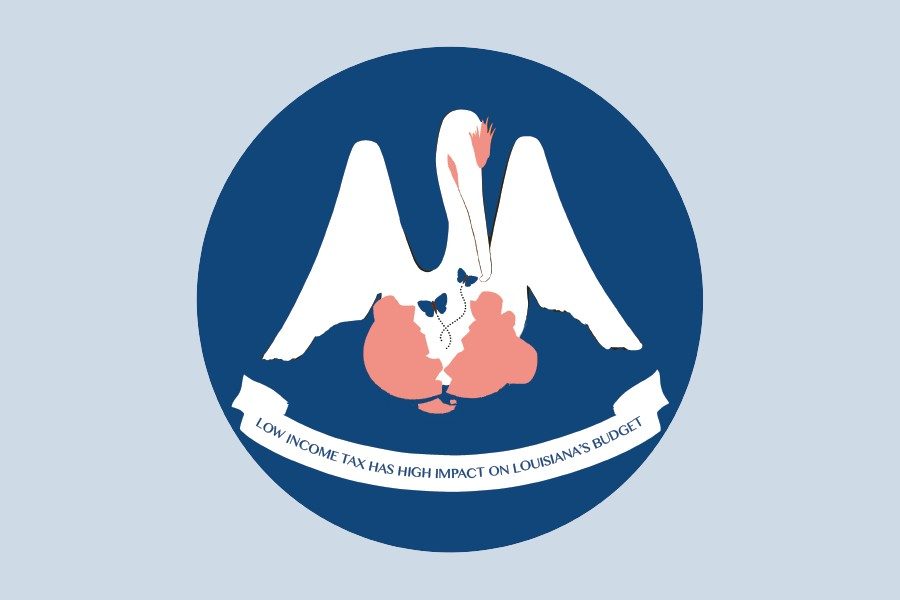Low income tax has high impact on Louisiana’s budget
Gabriel Clark-Clough | Contributing Artist
April 17, 2019
If nothing else, there is one thing that unites all drivers in New Orleans: the potholes. New Orleans and Louisiana are known for having poorly maintained infrastructure, which is exemplified in the pothole problems plaguing the city. In 2017-18, however, the Department of Transportation and Development received an additional $80 million in redistributed federal funds. The DOTD also reported that the state has been receiving additional funding for 18 years. If Louisiana is receiving so much money on top of its normal funding, why are the roads still falling apart?
Put simply, Louisiana needs to raise its taxes. When it comes to income, property and sales taxes by state, Louisiana averages in the bottom third – and it shows. The roads are not the only thing underfunded: in education, Louisiana spends over 6% less per student than the median national expenditure, and over 50% less than New York, the highest spending state.
On top of that, over 15% of Louisiana’s school funding comes from the federal government, and not from the state itself. Compared to states like California with only 9% coming from national grants, it is clear the Federal government is scrambling to make up the difference caused by Louisiana’s low tax rate. Because of its tax policies, Louisiana finds itself playing catch-up in improving its residents’ quality of life.
When it comes to income tax, Louisiana is in the lower half of the country. The top personal income tax in Louisiana is at 6% for individuals who make over $50,000 a year, with no graduated increase for higher brackets. For comparison, Oregon has a tax bracket of 9% for individuals who make over $8,900 a year, one and a half times higher, despite the significantly lower income standard. Meanwhile, states like California have many more brackets, generating greater income from individuals who can afford to pay more. While residents who make $50,000 pay 8%, those who make over $1,000,000 pay 13.3%. Altogether, there are already many models to increase state revenue, Louisiana just has to pick one.
As for property tax, at 0.52%, Louisiana’s is the third lowest in the country. Hawaii is the lowest overall with 0.27%, but because the median home value is $563,900 it can generate almost twice the revenue per parcel than Louisiana. With an already low median home value $152,900, by comparison the revenue generated is low. Without a higher per person amount of money, that state can only do so much to support its residents.
Lastly, the statewide sales tax was lowered 0.55% in July of 2018, making it the tenth lowest in the country. By keeping the tax rate so low, the state is hurting itself. Without enough funding going around statewide, municipalities are raising their tax rates up to an additional 7% on top of the statewide rate, the third highest municipal tax rate in the country. Aggregating the average tax rate with state, it becomes the second in the country.
With certain communities paying disproportionately higher rates in taxes to counterbalance the low state policies, many residents are negatively impacted. The higher tax rates do not necessarily follow in line with residents income or ability to pay the higher taxes, meaning that some residents can be severely affected. To counterbalance this, Louisiana should raise the overall tax and spread out the funding to the areas most in need.
Right now Louisiana is positioned well to raise taxes without dramatically affecting people’s lives. With the Trump administration’s new cuts to the federal taxes, if Louisiana decided to raise its taxes corresponding with the percentage that was dropped, Louisiana residents would be paying the same amount of taxes as before.
Also, since the federal tax cuts do not seem to be affecting the amount of funding Louisiana gets per year—the $80 million given by the DOTD the highest yet—the state raising taxes is not some desperate attempt to tread water. Instead, this is an opportunity for Louisiana to collectively gather more funding that it ever has before. With additional funding for education, infrastructure, disaster relief and all other aspects of government, Louisiana can launch ahead in terms of development.
With all tax areas holding the potential for reform, Louisiana can do a lot of good work for its residents by proactively stepping in front of government funding. In order to be ready for the next storm as big as Katrina, to train a high skilled workforce and to balance a sustainable budget, an increase in taxes will help a great many people.










Leave a Comment